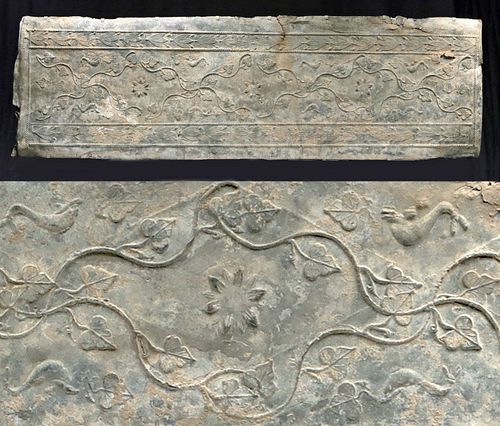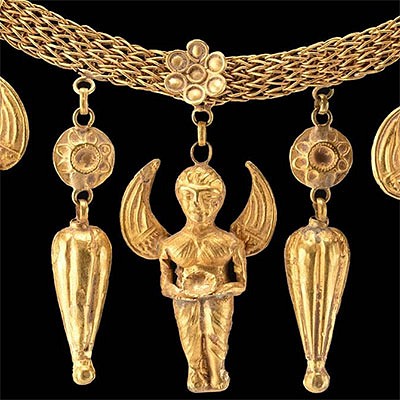Roman Lead Sarcophagus Panel Leaping Dolphins
Lot 24d
About Seller
Artemis Gallery
686 S Taylor Ave, Ste 106
Louisville, CO 80027
United States
Selling antiquities, ancient and ethnographic art online since 1993, Artemis Gallery specializes in Classical Antiquities (Egyptian, Greek, Roman, Near Eastern), Asian, Pre-Columbian, African / Tribal / Oceanographic art. Our extensive inventory includes pottery, stone, metal, wood, glass and textil...Read more
Categories
Estimate:
$12,000 - $13,000
Absentee vs Live bid
Two ways to bid:
- Leave a max absentee bid and the platform will bid on your behalf up to your maximum bid during the live auction.
- Bid live during the auction and your bids will be submitted real-time to the auctioneer.
Bid Increments
| Price | Bid Increment |
|---|---|
| $0 | $25 |
| $300 | $50 |
| $1,000 | $100 |
| $2,000 | $250 |
| $5,000 | $500 |
| $10,000 | $1,000 |
| $20,000 | $2,500 |
| $50,000 | $5,000 |
| $100,000 | $10,000 |
| $200,000 | $20,000 |
About Auction
By Artemis Gallery
Dec 3, 2020
Set Reminder
2020-12-03 10:00:00
2020-12-03 10:00:00
America/New_York
Bidsquare
Bidsquare : Fine Antiquities, Ethnographic & Fine Art
https://www.bidsquare.com/auctions/artemis-gallery/fine-antiquities-ethnographic-fine-art-6119
Features classical antiquities, ancient and ethnographic art from cultures encompassing the globe. Egyptian, Greek, Roman, Etruscan, Near Eastern, Asian, Pre-Columbian, Native American, African / Tribal, Oceanic, Spanish Colonial, Russian, Fine Art, so much more! All legally acquired, legal to sell. Artemis Gallery info@artemisgallery.com
Features classical antiquities, ancient and ethnographic art from cultures encompassing the globe. Egyptian, Greek, Roman, Etruscan, Near Eastern, Asian, Pre-Columbian, Native American, African / Tribal, Oceanic, Spanish Colonial, Russian, Fine Art, so much more! All legally acquired, legal to sell. Artemis Gallery info@artemisgallery.com
- Lot Description
Roman, Imperial Period, ca. 2nd to 3rd century CE. A rare complete panel from a lead sarcophagus, its surface decorated with relief images encoded by its makers with deep meaning about how Romans memorialized their elite dead. The top and bottom are bordered by wide horizontal bands of repeated dense leaves. In the center, vines weave through each other forming broad X's with large-petaled flowers at their centers. Above and below are repeated leaping dolphins. Size: 20.5" W x 67.5" H (52.1 cm x 171.4 cm) The panel is mounted on a piece of wood with a slightly smaller footprint.
Prior to the 2nd century, Romans cremated their dead; around that time, they became inspired by the Greek and Etruscan practice of using sarcophagi, and they began to make lead coffins. This trend spread rapidly throughout the Roman Empire. In the western part - where this panel likely came from, based on the leaf motif - sarcophagi were placed inside a mausoleum against a wall or in a niche. The leaves refer to actual garlands and flowers used to decorate tombs and altars. The dolphins, meanwhile, remind us of a powerful and common motif in Roman artwork. The Romans were largely a maritime empire, and the iconography of the sea included dolphins. Romans believed these animals carried souls to the Fortunate Isles, perhaps because they could pass through the air-breathing terrestrial world and into the watery depths that claimed so many Roman sailors' lives. This symbol must have had personal significance for the deceased, who often ordered lead coffins to be made long before they died - the process of making them required such a long time that they could not be rushed!
Provenance: private Dallas, Texas, USA collection; ex-Civilization Gallery, acquired in 1992
All items legal to buy/sell under U.S. Statute covering cultural patrimony Code 2600, CHAPTER 14, and are guaranteed to be as described or your money back.
A Certificate of Authenticity will accompany all winning bids.
We ship worldwide and handle all shipping in-house for your convenience.
#146670Unrepaired and unrestored, with a few small tears, mainly at the peripheries, and one small area of loss near the upper right (facing). Edges are curled under in places. Overall in great condition for its age and material, with nice patina and deposits on the surface that are commensurate with age but do not obscure the artwork.Condition
- Shipping Info
-
All shipping is handled in-house for your convenience. Your invoice from Artemis Gallery will include shipping calculation instructions. If in doubt, please inquire BEFORE bidding for estimated shipping costs for individual items.
-
- Buyer's Premium



 EUR
EUR CAD
CAD AUD
AUD GBP
GBP MXN
MXN HKD
HKD CNY
CNY MYR
MYR SEK
SEK SGD
SGD CHF
CHF THB
THB















